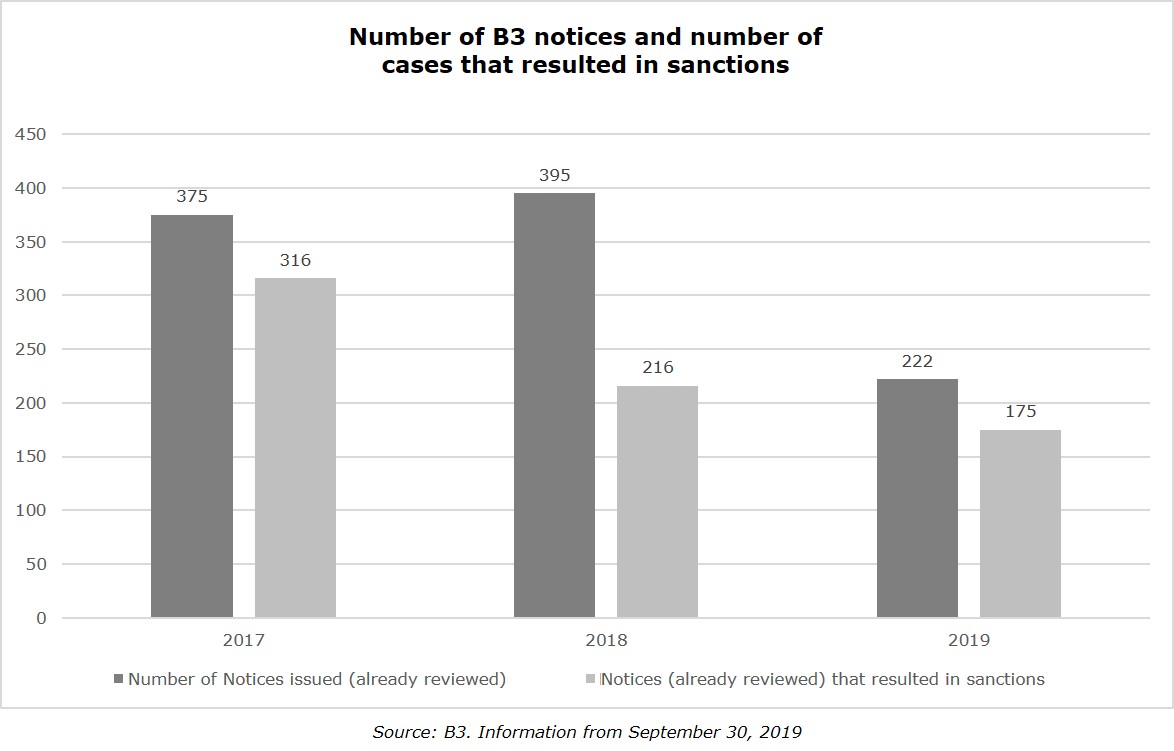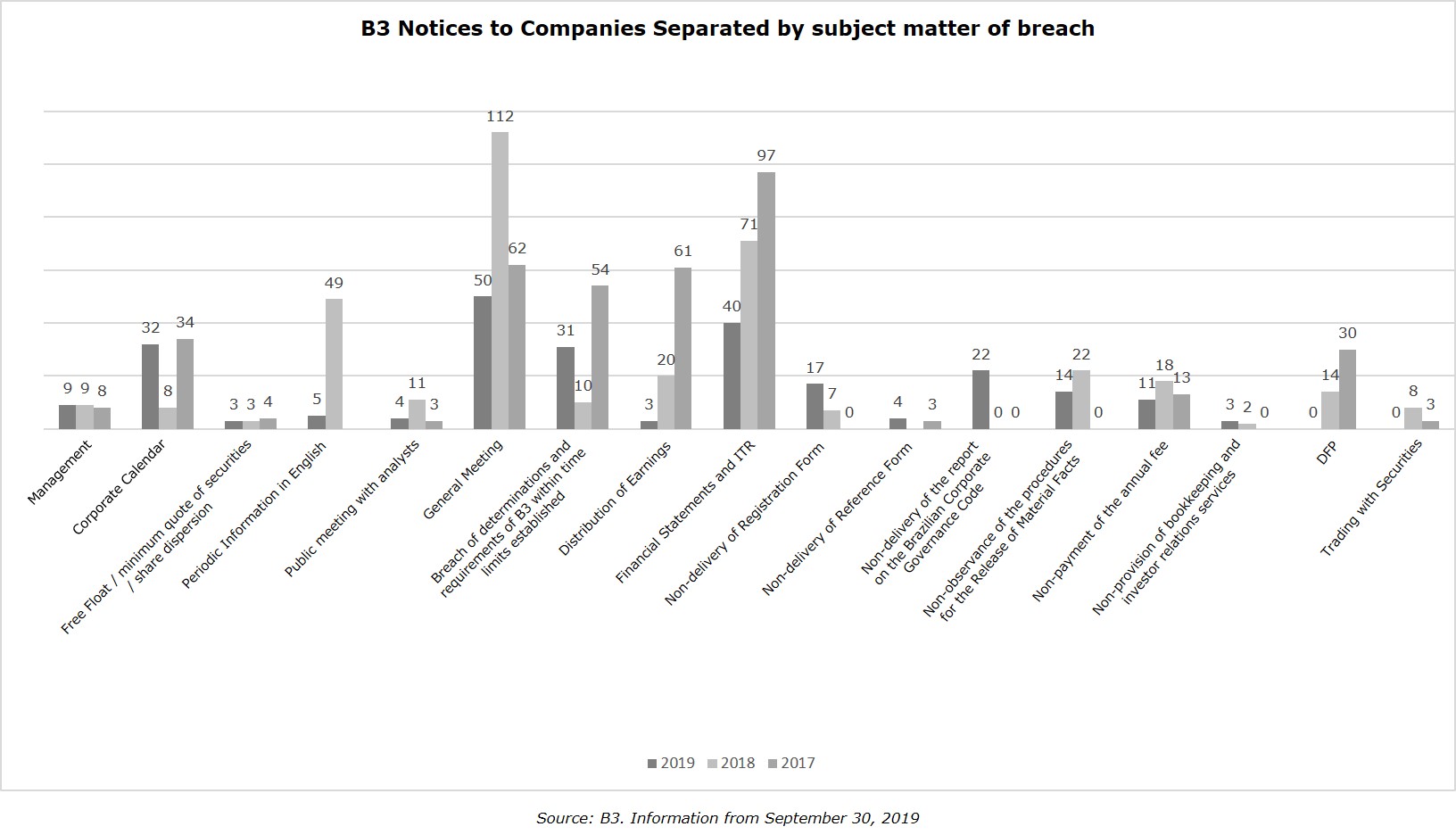It is increasingly important for publicly traded companies to dedicate themselves to fully complying with the obligations imposed by current laws and regulations, keeping themselves up to date, and having an adequate Investor Relations Department and legal support structure. Important changes have been observed in sanctions rules, as well as a significant increase in the obligations to be fulfilled, which increases the risks of non-compliance. We emphasize the sanction actions of the Brazilian Securities and Exchange Commission (CVM) for companies listed as public companies and the regulations of B3 S.A. - Bolsa, Brasil, Balcão (B3) for companies listed in the B3.
Recent changes in the rules for CVM sanctions procedures include profound changes by Law No. 13,506/17 (which followed Executive Order No. 784/17, which expired without being converted into law). The topic was dealt with in this portal in two articles:
- An analysis of the “new” administrative sanctions procedures of Bacen and CVM
- Law No. 13,506 and the actions of the Central Bank and CVM
In 2019, due to these legislative changes, CVM sought to consolidate the normative acts that regulated its sanctions procedures by publishing CVM instructions 607, 608, and 609, already dealt with in the Legal Intelligence Portal:
- CVM publishes new framework to regulate its sanction actions
- What changes in practice with the new regulatory framework for CVM's sanction actions
Regarding corporate governance, there have also been recent changes to applicable rules and regulations, among which one may highlight:
- Amendments to the provisions of the “novo mercado” regulation;
- Mandatory distance voting and its recurring updates; and
- The requirement to publish corporate governance reports.
- After so many changes, how are CVM's sanctions activities and B3's regulatory actions having an impact on companies?
In an analysis of the report on CVM’s sanctions activities, the 140% increase in the number of sanctions imposed by the authority in the year 2018, compared to 2017, is striking. Of particular note is the substantial increase in the number of warnings (342%) and fines (133%). In 2019 (until June 30), 106 sanctions were applied (72 of them in the form of fines), a number similar to the total recorded in 2017 (128 sanctions).
Another noteworthy fact is the increase in the average amount of the fines imposed by the authority (as a result of the increase allowed by Law No. 13,506): while in 2017 and 2018 the average amounts of the fines imposed by CVM was, respectively, R$ 1.5 million and R$ 1.4 million, in the first six months of 2019 it reached R$ 10.7 million.
Thus, the total amount of the fines imposed by CVM in the first half of this year already exceeds R$ 770 million, more than double what was collected via fines in 2018 and almost four times more than in 2017.
There was also a strong increase in the number of consent decrees approved by CVM joint board. In 2018, the increase was 56% over 2017, totaling 179 consent decrees. In addition, the amounts involved also increased, which we believe to be a reflection of the increase in the fines provided for in Law No. 13,506: in 2017, the total was R$ 20.7 million, with an average amount of R$ 180 thousand per consent decree; In 2018, it was R$ 41.2 million, with an average of R$ 230 thousand per consent decree; and, in 2019, only in the first half of the year, the total was R$ 25.1 million (considering the 73 consent decrees approved up to June), with an average unit value of R$ 344 thousand.
Regarding the regulatory action of B3, we review the enforcement report available on the Internet, which shows the number of notices sent by B3 to companies, and we find that there is not a significant variation from one year to another, as happened with CVM:

However, the variation in the most recurring matters related to notices sent by B3 in 2017, 2018, and in the first nine months of 2019 is significant.

The evolution in the numbers shows the importance that companies and managers must give to the full compliance with regulations for public companies in order to avoid heavy fines and other penalties. It is important to remember that the opening of investigations and proceedings also represents expense for and attention from management, which may divert its focus from executing the company's business strategy.
In addition, the increasing sanction actions of CVM and other self-regulatory entities, with concomitant increases in fines, may result in higher premiums in the purchasing of directors & officers (D&O) insurance and increased use of indemnity agreements by the companies in question, in substitution for insurance. In this sense, it is worth observing the dictates of CVM Guidance Opinion No. 38/2018, the subject of analysis by another article in this portal.
